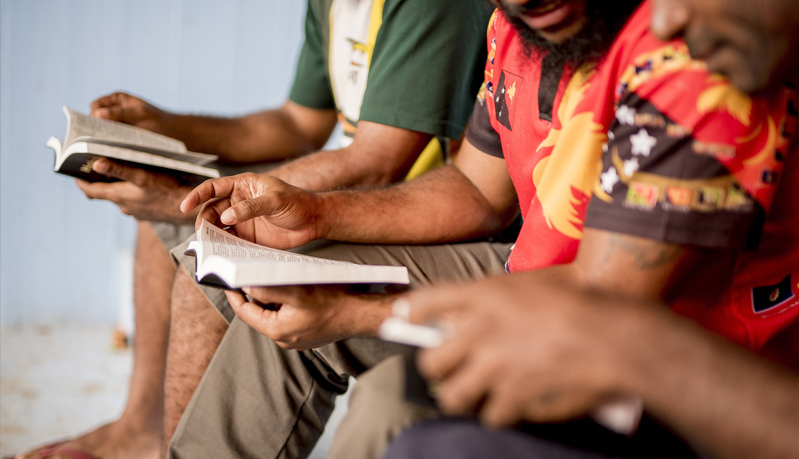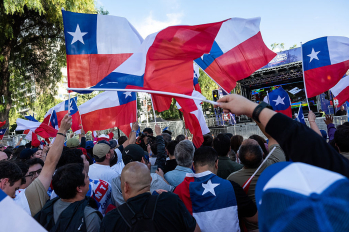
This opinion is the second of two. The first was a critical review of Disciple Making Movement by Dr David Williams, click here to read that review.
Our God has always been in the business of surprising humanity with his great works. His ways are higher than ours and his thoughts much higher. So, we face the constant challenge of trying to accurately understand the Lord’s works the in the world around us. In a globalized world, we face the even greater challenge of trying to accurately understand the Lord’s work in contexts much different than our own.
The challenge of context
We harbor the ever-present and dangerous blind spot of evaluating God’s work elsewhere based mainly on what we observe and “know” from our own cultural setting.
We (especially, I suspect, my fellow natives of the Global North) tend to view all things globally based on our own context and experience. We harbor the ever-present and dangerous blind spot of evaluating God’s work elsewhere based mainly on what we observe and come to know from our own cultural setting.
When God brought to earth his greatest surprise—the appearance of the Divine in human form—the thought leaders of that time and place formulated a wrong conclusion. After Jesus raised Lazarus from the dead, “The chief priests and the Pharisees called a meeting of the Sanhedrin. ‘What are we accomplishing?’ they asked. ‘Here is this man performing many signs. If we let him go on like this, everyone will believe in him, and then the Romans will come and take away both our temple and our nation’” (John 11:47-48, NIV).
These top leaders of God’s people knew their context well. Their assessment of both religious and national issues made sense, though impacted by political posturing. They saw clearly the dangerous implications arising from the unexpected movement developing, with Jesus as its catalyst.
Based on their extensive knowledge of and experience within their context, they welcomed the prophetic conclusion of Caiaphas, “It is better for you that one man die for the people than that the whole nation perish” (John 11:50b). Their confident assessment of the situation led them decisively to their conclusion—one diametrically opposed to the greatest move of God happening in their time.
Hundreds of years later, on a different continent, John Wesley’s so-called radical practice of preaching outside church buildings played a crucial role in launching the Methodist movement and reaching thousands with the gospel. But most religious leaders at the time scorned Wesley’s approach, and he was banned from preaching in most of the churches in London.”
Those considered religious experts by themselves, and the general populace, gave an assessment that apparently proved contrary to the opinion of God himself. He blessed the early Methodist movement with astonishing fruit in the salvation of multitudes of lost people.
The challenge of self-focus
Church Planting Movements… have begun to flourish, primarily among people without a ready access to the gospel.
In the last three decades, Church Planting Movements (some of which have been described as Disciple Making Movements, which, for this essay, is considered synonymous) have begun to flourish, primarily among people without a ready access to the gospel in the Majority World. This has been well documented.
Reports of these movements have generated mixed response among Christians elsewhere in the world. While some have responded with delight and eagerness to see what can be learned from these movements, others have responded with skepticism and critique.
As regards supportive responses see, for example, the 24:14 Coalition, which consists of leaders of numerous movements, as well as practitioners from the Global North. Also the Motus Dei Network, which includes movement researchers from both the Global South and the Global North.
Among the most prominent of critics has been Radius International a missionary training organization committed to propagating and defending the pattern of missionary church planting common during what has been called “The Great Century” of Protestant missionary effort practiced by men such as William Carey, Hudson Taylor, and Adoniram Judson. This great century also happens to be known as the height of European colonialism.
The critiques offered by Radius International can be found, for example, in the booklet “Brief Guide to DMM: Defining and Evaluating the Ideas Impacting Missions Today” and this panel discussion at a Radius Missiology Conference: #RMC21 Panel 1: Trends in Missions With Chad Vegas, Paul Davis, Wayne Chen, and Brad Buser.
Other prominent critics include Mark Dever, as seen in this Youtube interview, and his organization 9 Marks, which aims to help pastors, future pastors, and church members build “healthy churches,” in accordance with what they proclaim as the “nine marks” of a healthy church. See also “No Shortcut to Success: A Manifesto for Modern Missions“ by Matt Rhodes, a 9 Marks publication.
The 9 marks promoted are: expositional preaching, gospel doctrine, conversion and evangelism, church membership, church discipline, discipleship and growth, church leadership, prayer, and missions. Each sounds unarguably biblical, yet 9 Marks defines some of them in ways more dependent on specific Western (or even more specifically, American Evangelical) church traditions than biblical commands.
A good dose of ethnocentrism is discernible in these biases.
Most critiques of Church Planting Movements seem sincerely motivated by desire for soundly biblical missions and church practice. However, many of the attacks consist of generalized speculation or accusations based on extrabiblical ecclesiological assumptions arising from their particular context rather than well-informed discernment concerning the Lord’s work in our day. A good dose of ethnocentrism is discernible in these biases. These problems are addressed at length in my book, Jonathan Edwards on Movements.
A challenge to one critique
Contrary to its title, one recent imbalanced perspective on movements can be found in the article “Disciple Making Movements: Applying a Faithful Balance,” by David Williams for Lausanne’s Global Analysis.” The article begins with a good general description of Disciple Making Movements, but Williams’ central point of concern consists of a false equivalence fallacy. The mistake can be described as, X reminds me of Y. So, since Y is problematic, X is also problematic.
David begins the section “Speed and Scope in Western Secularism” writing, “However, the themes of speed and scope also pose risks for late modern Western Christians living in a secular culture.” This misses the point that the vast majority of Church Planting Movements are not taking place among late modern Western Christians living in a secular culture. Neither are they being initiated by late modern Western Christians living in a secular culture.
While I respect his expertise as a missions educator, Williams appears to be observing and writing as a late modern Western Christian living in a secular culture, with limited direct experience with Church Planting Movements. He quite accurately identifies a problem in most Western societies: depending on human effort to achieve social acceleration (the “Y is problematic” aspect of the false equivalence fallacy). But he wrongly attributes this Western problem to Church Planting Movements, which at present are mainly rooted in the Global South and catalyzed by Majority World Christians.
The article’s reference to “the themes that shape the ‘WEIRDER’ (Western, Educated, Industrialized, Rich, Democratic, Ex-Christian, and Romantic) secular West” ironically betrays Williams’ perspective as firmly rooted in concerns of the Western world more than concerns needful for the Global Church. He rightly appreciates much of what he sees God doing in and through Church Planting Movements, yet his attempt at “faithful balance” consists of Western problems imputed to them—with words of caution lest Christian observers in the West have their perspective tarnished by those problems.
Williams invites readers to identify “false cultural dichotomies” and “avoid simplistic either/or thinking.” Yet he fails to recognize the false dichotomy of quantity (“speed and scope,” “big and quick”) versus quality (“slow and laborious ministry”) as foundational to his critique. The New Testament clearly reflects a high value on both quantitative and qualitative growth. We easily see this in the “spread rapidly and be honored” of 2 Thessalonians 3:1 and in Jesus’ frequent use of agricultural metaphors for God’s kingdom, with wise farmers valuing both the health and abundance of their crop.
A challenge to us all
None of us, from any culture, have the final word on God’s works in our time.
We all, by nature, first view any phenomenon from our own personal and cultural vantage point. Yet, when we attempt to evaluate a phenomenon happening among faithful brothers and sisters in a different culture, we do well to listen well to the assessment of those closest to the action. None of us, from any culture, have the final word on God’s works in our time.
We also do well to discern together, as the global Body of Christ, the ways God is working at present. Networks such as 24:14 and Motus Dei offer examples of such engagement. Book-length case studies by leaders of movements in the Majority World can also help provide some of the balance needed in Global North leaders’ analyses of these movements.
For some examples of book-length case studies see: Bhojpuri Breakthrough: A Movement that Keeps Multiplying by Victor John; Cabbages in the Desert: How God Transformed a Devout Muslim and Catalyzed Disciple Making Movements among Unreached Peoples by Aila Tasse; and the newly released Living Fire: Advancing God’s Kingdom in Challenging Places by Aychi B.R.
When we glimpse evidence that God may be doing something new and unique, it becomes all the more important to pay close attention to perspectives and voices different than our own. In the twenty-first century global Body of Christ, we have the privilege of connecting to, and listening to, brothers and sisters from other continents and cultures.
The better we do this, the more effectively we can overcome the blind spots inherent in our own context and experience. And together we can more fully rejoice when the Lord does fresh and marvelous deeds in our day.
Originally published by World Evangelical Alliance Mission Commission. Republished with permission.
Dave Coles is an encourager and resourcer of church planting movements with Beyond, serving there since 2014. He is also lead facilitator of the Bridging the Divide Network, a member of the Motus Dei Network facilitation team, a member of the 24:14 Coalition, and World Evangelical Alliance Mission Commission Synergist for Church Planting & Movements. He holds an M.Div. from Trinity Evangelical Divinity School, has served for 10 years as a pastor in Upstate New York, and 24 years as a teacher, church planting facilitator, and area leader in Southeast Asia. Dave has over a dozen articles published (under a pseudonym) on topics related to contextualization, reaching Muslims, and the nature of the church. He is co-author with Victor John of "Bhojpuri Breakthrough: A Movement that Keeps Multiplying", co-editor with Stan Parks of "24:14—A Testimony to All Peoples", co-author with Aychi B.R of Living Fire: Advancing God’s Kingdom in Challenging Places, and author of Jonathan Edwards on Movements.





